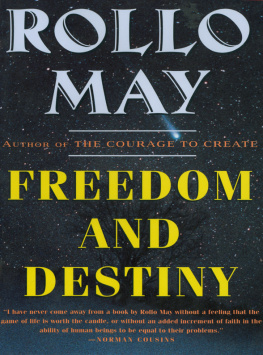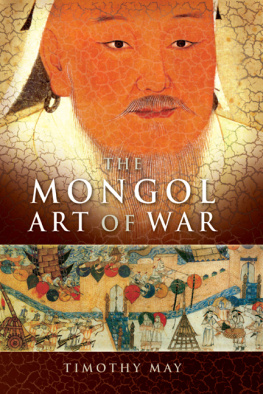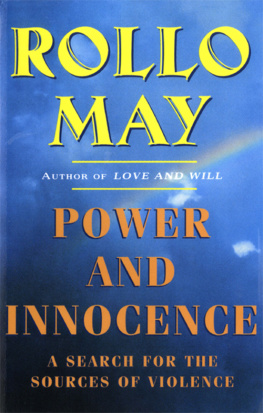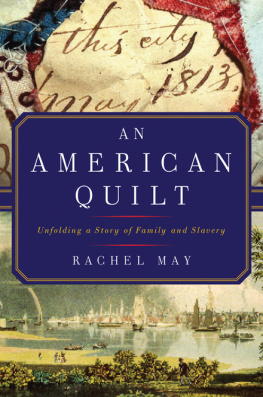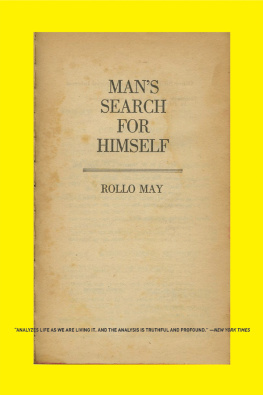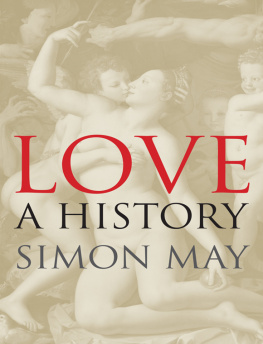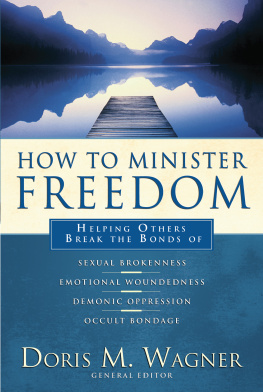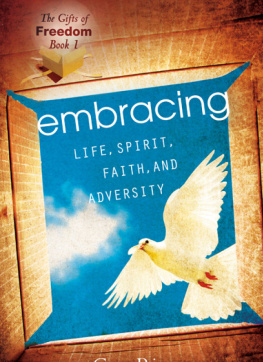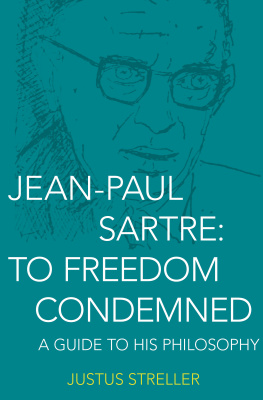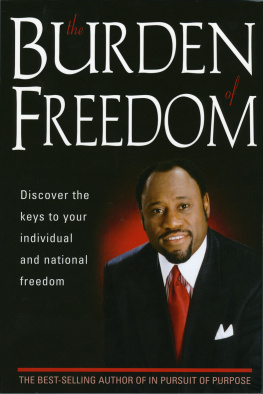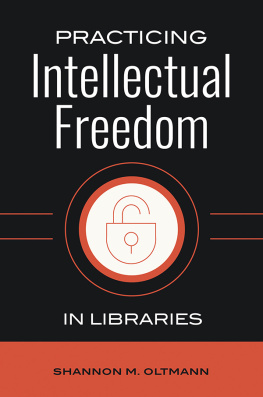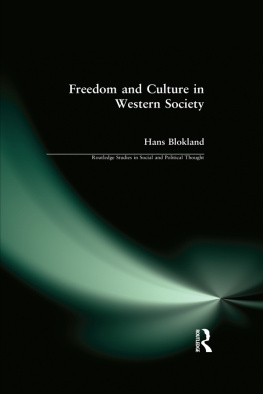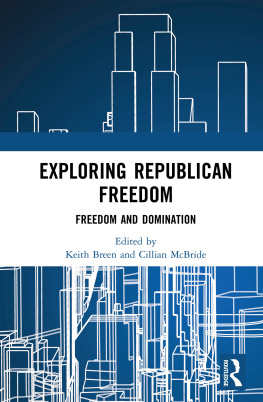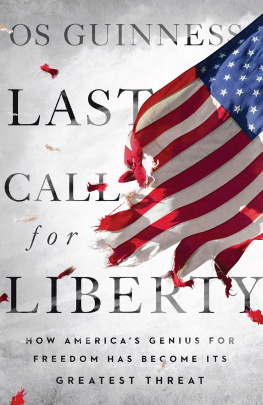By the same author
THE MEANING OF ANXIETY
MANS SEARCH FOR HIMSELF
POWER AND INNOCENCE
THE COURAGE TO CREATE
PSYCHOLOGY AND THE HUMAN DILEMMA
LOVE AND WILL
THE DISCOVERY OF BEING
THE CRY FOR MYTH
The true end of Man is the highest and most harmonious development of his powers to a complete and consistent whole. Freedom is the first and indispensable condition which the possibility of such a development presupposes.
KARL WILHELM VON HUMBOLDT
Freedoms just another word for nothin left to lose.
K. KRISTOFFERSON AND F. FOSTER, Me & Bobby McGee
It is a startling fact that freedom has been considered, throughout human history, so precious that hundreds of thousands of human beings have willingly died for it. This love of freedom is seen not only in venerated persons like Giordano Bruno, who died at the stake for his freedom of belief, and Galileo, who whispered to himself in the face of the Inquisition that the earth does move around the sun, but it is also true for hosts of people whose names are forever unsung and unknown. Freedom must have some profound meaning, some basic relation to the core of being human, to be the object of such devotion.
Many people still assume that they and their countrymen should be ready to die for freedom. This feeling typically takes the form of patriotism. Other persons who would not agree that political freedom is worth dying for would nevertheless state the same thing about psychological and spiritual freedomthe right to think and to command ones own attitude free from the 1984 type of spiritual surveillance. For reasons that are endless in their variety and that are demonstrated from the beginning of history down to the freedom marches and freedom rides of this century, the principle of freedom is considered more precious than life itself.
We have only to glance at the long line of illustrious persons to see that, in the past at least, freedom, in the words of Henrik Ibsen, was our finest treasure. Jean Jacques Rousseau was profoundly impressed by the fact that people will endure hunger, fire, the sword and death to preserve only their independence. About freedom he continues: Human beings sacrifice pleasures, repose, wealth, power and life itself for the preservation of this sole good., wrote Kant, that freedom is worthless for those under ones control and that one has the right to refuse it to them forever, is an infringement of the rights of God himself, who has created man to be free.
Similarly Schelling made a passionate defense of freedom: in its own terms, seems as necessary as the first postulate of geometry, to draw a straight line. Just as little as the geometrician proves the line, should the philosopher prove freedom. In other words, the truth of freedom is self-evident; that is an inalienable right.
Though we shall later consider the empirical definitions of freedom, it is noteworthy that Schelling believed that freedom was axiomatic, that even to think and talk presupposed freedom, and hence no proof was necessary. The capacity to experience awe and wonder, to imagine and to write poetry, to conceive of scientific theories and great works of art presupposes freedom. All of these are essential to the human capacity to reflect. Indeed, in the same vein as Schelling, an intellectual of the modern day, Sir Isaiah Berlin, remarks: in human history has praised freedom.
Why these unending and extravagant panegyrics? Why should freedom be so venerated, especially in a world where practically nothing else is granted that devotion?
To answer these questions we need to understand the uniqueness of freedom. Every other reality in human experience becomes what it is by its nature. The heart beats, the eyes see; it is their nature to do what they do. Or, if we take something inorganic like values, we know what the nature of truth ise.g., to state things as close to the reality as possible. And we know the meaning, or the nature, of the value of beauty. Each of these functions in the human being according to its own nature.
What, then, is the nature of freedom? It is the essence of freedom precisely that its nature is not given. Its function is to change its nature, to become something different from what it is at any given moment. Freedom is the possibility of development, of enhancement of ones life; or the possibility of withdrawing, shutting oneself up, denying and stultifying ones growth. This uniqueness makes freedom different from every other reality in human experience.
Freedom is also unique in that it is the mother of all values. If we consider such values as honesty, love, or courage, we find, strangely enough, that they cannot be placed parallel to the value of freedom. For the other values derive their value from being free; they are dependent on freedom.
Take the value of love. How can I prize a persons love if I know the love is not given with some degree of freedom? What is to keep this so-called love from being merely an act of dependency or conformity? take concrete shape only in freedom, writes Jacques Ellul. It takes a free man to love, for love is both the unexpected discovery of the other and a readiness to do anything for him.
Take also the value of honesty. Ben Franklin proclaimed his alledgedly ethical principle, Honesty is the best policy. But if it is the best policy, it is not honesty at all but simply good business. When a person is free to act against the monetary interest of his or her company, that is the authentic value of honesty. Unless it presupposes freedom, honesty loses its ethical character. Courage also loses its value if it is supposedly exhibited by someone who is coerced into it.
Freedom is thus more than a value itself: it underlies the possibility of valuing; it is basic to our capacity to value. Without freedom there is no value worthy of the name. In this time of the disintegration of concern for public weal and private honor, in this time of the demise of values, our recoveryif we are to achieve itmust be based on our coming to terms with this source of all values: freedom. This is why freedom is so important as a goal of psychotherapy, for whatever values the client develops will be based upon his experience of autonomy, sense of personal power and possibilities, all of which are based on the freedom he hopes to achieve in therapy.
Freedom endlessly re-creates itself, gives birth to itself. Freedom is the capacity, we have seen, to transcend its own naturean occurrence in which that overused word transcend really fits. We begin to appreciate the great fascination that freedom, phoenixlike in its capacity to rise from its own ashes, exercised on our ancestors. We begin also to experience the dangers in freedom. People will cling to freedom, treasure it, die for it if necessary, or continually yearn and fight others for it if they do not now enjoy it. And it is still true, according to the statistical studies of Milton Rokeach, that the majority of people place freedom highest on their list in the ranking of values.
This constitutes the radical difference between the slave and the free citizen in and in the South of the United States in the days of slavery. The slaves might have been well taken care of physically, well fed and well treatedin fact, often better than if they had supported themselves in freedom. But they did not have the inalienable human right to assert publicly their own beliefs or even to believe something different from what their masters believed. Taking the name of the master is a symbol of this built-in subordination to someone else in contrast to the free citizen; we recall the struggle of the chief characters in Roots to preserve their original name even on tombstones. This also is true in marriage and has been attacked by the womens liberation movement.
Next page
